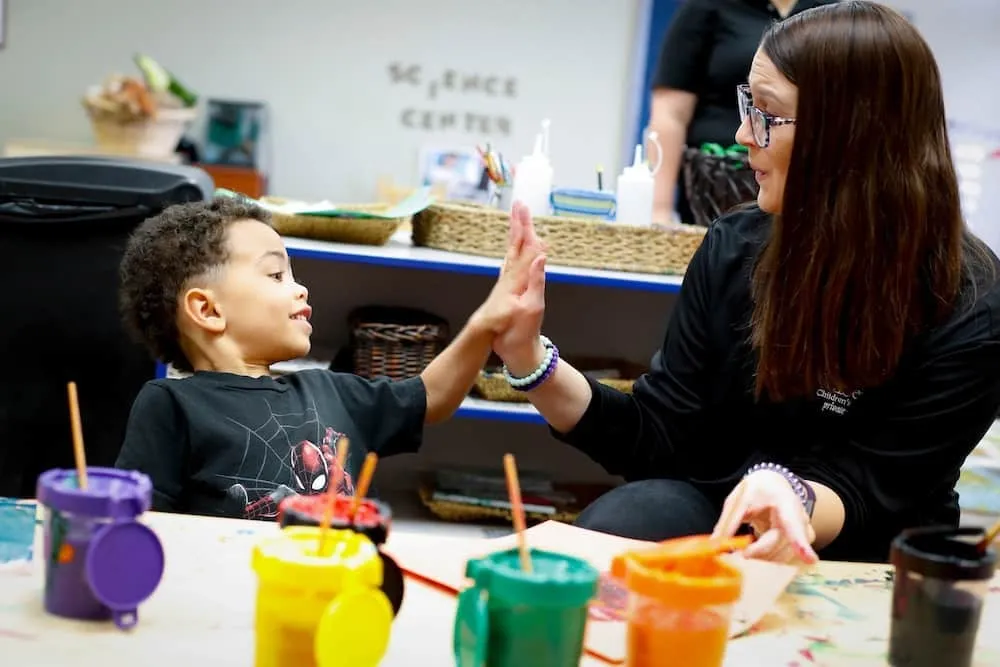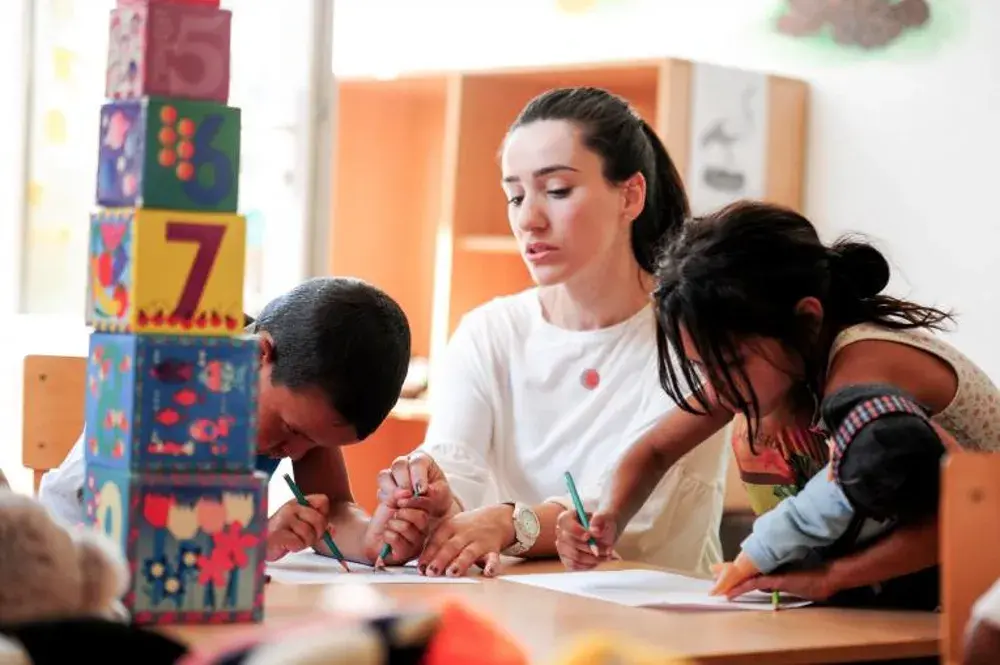DECCE

Source: media
DECCE
Early Childhood Care and Education is one of the fastest-growing sectors in the educational arena. With programs for children in the age group of 3 to 6 years being launched on a massive scale across India having a career in the field of DECCE might be the biggest leap of your professional journey
Are you curious about a career in early childhood education?
To be a part of this booming field of Early Childhood education and to be a top-notch Early Childhood Educator one has to pursue a DECCE that shall provide you with the intellect and strategies for fostering the all-round development of children. At Vidhyanidhi Education Society, we understand the significance of nurturing future educators who can shape the minds of the next generation.
So, what can you expect from the DECCE course?
- Skill Development: The curriculum covers vital areas such as child psychology, learning theories, and classroom management, helping you cultivate a versatile skill set.
- Practical Exposure: Beyond bookish knowledge, we offer hands-on experiences through internships and workshops. You get a chance to apply your learnings in real-world settings.
- Holistic Training: You’ll learn not just about academic education but also the importance of play, creativity, and emotional intelligence in early childhood education.
- Community Building: Interact with peers and mentors who share your passion. The collaborative environment enriches your learning journey.
The DECCE is more than just a diploma; it’s a pathway to making a tangible difference in young lives. Stay tuned to find out more about the program, career prospects, and tips to excel in this ever-evolving field.
Table of Content

Source: istockphoto
DECE Full Form
DECE Full form stands as Diploma in Early Childhood Care and Education which Offers a balanced mix of theoretical knowledge and practical skills. The DECE Course is tailored for those aiming to teach young children. It primarily targets the educational needs of children between 3 and 6 years old.
DECE Course Scope
After completing a course in Early Childhood Education, a wide range of fulfilling career paths become available. Each role plays a unique part in shaping the minds and futures of young children.
Considering the ever-growing need for trained Early childhood educators the DECE Course Scope is quite wide and some of the prime job roles have been listed below
Below are some roles you might consider:
Teacher for Young Learners
Take the lead in a classroom for children who are just starting their education journey in established schools’ Pre-Primary section.
Entrepreneur in Preschool Education
Launch your own preschool or join an existing chain as a franchisee.
NGO Worker
Align yourself with non-profits focused on child development and make a difference in young lives.
Kindergarten Instructor
Employ the playway method to encourage holistic development in students at reputable kindergartens.
Nursery Teaching Aide
Support the lead teacher in a nursery classroom, helping children learn through creative methods.
Getting trained from a well-established govt registered platform of Vidhyanidhi Education Society and acquiring an DECCE certification will help you get the right mindset for a flourishing career.
Contact us at +919869546913 / +919869866277 for any queries or information.
Click Here to download our informative brochure.
Online DECE Course
If you’re interested in a career in early childhood education, consider enrolling in a DECE course with VES, an institute that has made a significant impact in teacher training.
Vidhyanidhi Education Society has launched an Online DECE Course that is designed to suit the needs of the learners to enable them to acquire top-quality education and launch a rewarding teaching career.
A few attributes of the DECCE Course offered on the online mode are as follows;
Modernized Course Content
Benefit from a curriculum that prepares you for the evolving landscape of education.
Economical Study
Save on travel-related expenses, thanks to the online mode of learning.
Time-Efficiency
Take advantage of the self-paced learning environment to make the most out of your day.
Lifestyle Integration
The course’s flexibility makes it possible to fulfill both personal and professional obligations.
Dedicated Course Support
Have your questions and concerns addressed by a specialized course coordinator.
Reasonable Fee Schedule
Access quality education at a budget-friendly price.
Pay in Parts
Enjoy the convenience of splitting your fees into manageable payments.
Flexible Payment Modes
Select from a variety of options for fulfilling your tuition fees.
These unique features of the DECCE Course through online mode make VES the most favorable choice amongst aspirants for a lucrative career.

Source: cadence
DECE Course Details
DECE provides straightforward educational routes for learners at different stages.
Here are the essential DECE Course details:
- A one-year UG Diploma for those straight out of high school.
- A two-year PG Diploma for those holding a Bachelor’s degree in any field with a 55% average.
- Learning pathways: Classroom-based, written correspondence, or online methods.
DECE Course Duration
Whether you’ve completed your high school or have a college degree, Vidhyanidhi Education Society has a DECE Diploma tailored for you. The Undergraduate Diploma takes one year, while the Postgraduate Diploma takes two. An accelerated Fast Track mode is also on offer.
The DECE Course duration is mentioned below;
- A one-year Undergraduate Diploma awaits high school graduates.
- A Postgraduate Diploma lasting two years is available for college graduates.
- Complete your program more quickly with the Fast Track mode.
DECE Study Material
The VES DECE course offers a well-rounded curriculum that blends classic and modern teaching methods, making you a versatile and confident early childhood educator.
The DECE study material comprises of theory modules on various topics that highlight ways of how to nurture young minds and transform them into independent learners.
Course Breakdown for Diploma in Early Childhood Education:
- Preschooler’s Mindset and Thought Patterns
- Multi-Faceted Development in Children: Social, Emotional, Physical, Cognitive
- Influential Teaching Methods in History
- Effective Preschool Management Techniques
- Language Acquisition and Literacy Development
- Phonics for Beginners
- Universal Design for Learning in Early Education
- Creative Artwork and Crafting
- Coordinated Movements and Dance Basics
- Classic and Modern Storytelling, Songs, and Rhymes
ECCEd Course Fees
For those aspiring for a stable teaching role, VES offers a quality education at prices that won’t break the bank. Our flexible instalment plans make it easier to manage your finances. You can choose from several payment methods, like online transfers, GPAY, and Cheques.
At Vidhyanidhi Education Society the ECCED Course fees levied are at a cost that is extremely affordable and very easy on the pocket for budding teachers.
DECE Course Jobs Salary
With a DECE certification in hand, you have a good shot at finding a lucrative job at a reputable preschool in India. Your earnings of DECE Course Jobs Salary can range from 20,000 to 30,000 INR per month, influenced by the school’s location and your skill level. Jobs in international schools often offer better financial incentives. To establish a fulfilling career, consider enrolling in VES’s Early Childhood Programs.
Contact us at +919869546913 / +919869866277 for any queries or information.
Click Here to download our informative brochure.

Source: naeyc
Courses after 12th for Teaching
At Vidhyanidhi Education Society (VES), we are steadfast in our commitment to delivering top-quality training programs that arm you with the requisite skills, knowledge, and insights for a flourishing teaching career.
Here, we break down our offerings into different categories to give you a clear understanding of how each course is specially designed to meet varying needs and objectives.
The List of Courses after 12th for Teaching are as follows;
Diploma and PG Diploma in Teacher Training
- Early Childhood Education (ECCE): A stepping stone for those interested in preschool and kindergarten teaching.
- Pre-Primary Teacher Training (PPTT): Ideal for those wanting to specialize in instructing children aged 2-5.
- Nursery Teacher Training (NTT): Perfect for future educators who wish to engage with children at the nursery level.
- Montessori Teacher Training (MTT): Focuses on the Montessori method, promoting child-centric teaching.
- Primary Teacher Training (PTT): Concentrating on grades 1–5 for individuals intending to teach at the primary level.
- Post-Graduate Diploma in Teacher Training: An advanced course for graduates who want to focus on education more specifically once they have received their degrees.
Diploma in Learning Disability
- Foundational Course: Gain an understanding of the types, assessments, and interventions for learning disabilities.
- Instructional Strategies: Learn teaching methods tailored for children with learning disabilities.
- Classroom Management: Explore strategies for managing a diverse classroom effectively.
Diploma in Special Education Need
- Understanding Special Needs: A crucial course that focuses on the different kinds of special needs children may have.
- Individualized Educational Plan (IEP) Development: Learn how to develop tailored learning plans for students with special needs.
- Inclusive Education Strategies: Equip yourself with techniques to include special needs children in mainstream classrooms.
Certificate in Shadow Teacher Training
- Role of a Shadow Teacher: Understand the duties and responsibilities involved in being a shadow teacher.
- Behavioral Interventions: Learn effective strategies to manage and improve student behavior.
- Monitoring and Assessment: Gain expertise in evaluating academic and social progress of the child.
School Administration and Management Courses
- Leadership Skills: Build capabilities in decision-making, conflict resolution, and resource management.
- Educational Laws and Policies: Familiarize yourself with the legal aspects of running an educational institution.
- Quality Control: Understand the benchmarks and guidelines for maintaining educational standards.
Phonics Teacher Training Program
- Phonemic Awareness: Understand the role of phonemic awareness in early literacy development.
- Phonics Instructional Methods: Learn the most effective techniques for teaching phonics.
- Classroom Activities: Discover engaging activities that help solidify phonics understanding.
Grammar Teacher Training Programme
- Syntax and Structure: Master the basics of sentence formation and complex grammatical rules.
- Interactive Grammar Teaching: Learn how to teach grammar through interactive and engaging methods.
- Assessment Techniques: Understand how to evaluate your students’ grasp of grammar effectively.
Why Choose VES?
You may put your faith in the Vidhyanidhi Education Society when it comes to the pursuit of educational excellence. Each course we provide has been painstakingly created to guarantee that you leave with more than just academic understanding; you’ll also leave with the skills necessary to have a significant effect on the educational environment. Join us today and set your career path toward achieving great heights.

Source: unicef
What Early Childhood Educators Do?
Early Childhood Educators have a large role to play in the all-round development of children in the age group of 3 to 6 years The age group of 3 to 6 years is a crucial age as the maximum brain development happens here and therefore the child has to be provided with ample learning experiences to. to encourage young children’s social, emotional, physical, and cognitive development.
Here are some key aspects of what early childhood educators do:
Curriculum Development
Age-appropriate curriculum are created and implemented by early childhood educators to enhance children’s learning and growth. They design lesson plans and exercises that correspond to the aims and objectives of education.
Child Observation
They observe and assess children’s behavior, skills, and progress to identify individual needs and developmental milestones. This helps in tailoring educational approaches to each child’s unique requirements.
Classroom Management
Early childhood educators create a safe, nurturing, and stimulating learning environment. They set up schedules, guidelines, and expectations to encourage children’s good conduct and social relationships.
Social and Emotional Development
Inculcating empathy and respect for everyone functioning in harmony helps a child to progress emotionally and socially. This helps the child in building a strong identity making him a confident and strong-willed individual.
Contact us at +919869546913 / +919869866277 for any queries or information.
Click Here to download our informative brochure.
Language and Literacy Development
Educators promote language development by engaging children in activities that enhance communication skills, vocabulary, and pre-reading abilities. They may read stories, sing songs, and encourage storytelling.
Math and Science Exploration
Through interactive activities and play, early childhood educators explain fundamental mathematics and scientific ideas. They motivate kids to investigate and ponder their surroundings.
Art and Creativity
They provide kids the chance to express themselves artistically and develop their creativity via many mediums including drawing, painting, and crafts.
Physical Development
By planning games and activities that improve children’s motor abilities, coordination, and physical fitness, educators aid in the physical development of their students. These may include games, outdoor play, and gross motor skill exercises.
Parent and Family Engagement
They communicate regularly with parents and caregivers to share children’s progress and discuss any concerns. Providing families with knowledge of how to support the child’s learning at home.
Inclusion and Special Needs
Helping children with special needs and facing learning difficulties with appropriate specific teaching strategies. They may collaborate with specialists to ensure all children receive appropriate support and accommodations.
Assessment and Documentation
They maintain records of children’s progress, including observations, assessments, and developmental milestones. This information helps in tracking and supporting each child’s growth.
Professional Development
To stay updated with the latest teaching methods and research, early childhood educators often engage in ongoing professional development and training.
Advocacy
Some educators engage in advocacy efforts to promote the importance of early childhood education and secure resources and policies that support quality early education programs.
In summary, early childhood educators play a pivotal role in fostering the holistic development of young children. They provide a foundation for lifelong learning and help children build essential skills and abilities during their formative years.
Train to Be an Early Years Teacher
Education, practical experience, and training in child development, learning theories, classroom management, and curriculum design for young children are all required to become an early years teacher.
The procedure might differ by nation and jurisdiction, however the following is a typical outline:
Steps to Becoming an Early Years Teacher
Educational Requirements
- A bachelor’s degree in early childhood education, child development, or a similar discipline is required for entry. You may also be able to get a degree in a different field and then finish a course of study leading to certification in early childhood education.
Field Experience
- Practicum: You could be required to do a practicum or student teaching experience in a classroom as a requirement for your degree program. You get practical experience in curriculum development, classroom administration, and student engagement as a result.
Licensing and Certification
- Licensing Exam: To become a certified Early Years Teacher, you must pass a license test in several nations, including the US. Your understanding of teaching, child development, and other related subjects will be tested on this exam.
- Background Check: Prior to being able to obtain a teaching license, you will normally need to pass a criminal background check.
Professional Development
- Continued Education: Some jurisdictions require ongoing professional development or a master’s degree for license renewal.
- Join Professional Organizations: To keep up with industry best practices and network with other professionals, it may be beneficial to join organizations like the National Association for the Education of Young Children (NAEYC) or analogous groups in your nation.
Specializations
- During your initial training or as part of your continuous professional development, you can choose to specialize in areas like Special Education, Teaching English as a Second Language (TESOL), or educational technology, among others.
Job Search
- Once certified, you can begin to apply for Early Years Teacher positions in public and private schools, childcare centers, and other educational institutions.
Career Growth
- With experience and additional training, you may advance to roles like lead teacher, curriculum coordinator, or even a school administrator.
Skills Needed
- Communication: Ability to communicate effectively with both children and adults.
- Creativity: Developing engaging lesson plans and activities.
- Patience: Working with young children requires a high level of patience.
- Observational Skills: You need to be good at observing children’s behavior and learning patterns.
- Leadership: Ability to manage a classroom effectively.
Resources
- Textbooks: Stay updated with teaching methodologies, child psychology, and curricula through academic literature.
- Online Courses: Specialized courses in early childhood education are available on websites like Coursera, edX, and others.
- Workshops/Seminars: These are often conducted by educational institutions or professional groups and offer practical training.
Becoming an Early Years Teacher is a rewarding career that allows you to play a significant role in children’s development. Each country will have its own certification requirements and standards, so be sure to research what is needed in your jurisdiction.
DECCE
“Unlock your potential in early childhood education. Enroll in DECE now!”
Contact us at +919869546913 / +919869866277 for any queries or information.
Click Here to download our informative brochure.
FAQ
What is the Course of DECE?
DECE is a Diploma in Early Childhood Education offered by Vidhyanidhi Education Society equipping aspirants with teaching strategies for kids aged 0-8 years.
What are the Subjects in DECE?
Subjects in DECE usually include Child Psychology, Teaching Methodologies, Nutrition and health, and Curriculum Planning, among others.
What are the Benefits of DECE Course?
Benefits of DECE include career advancement in pre-primary education, and enhanced teaching skills that guarantee trainees a promising teaching career filled with benefits.




